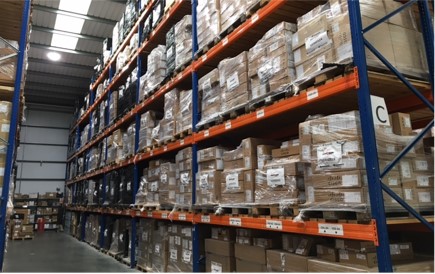Successfully navigating myriad global logistics challenges
6th May 2021

Events such as the Icelandic volcano eruption in 2011 that grounded thousands of flights and the more recent Suez Canal blockage illustrate that there is an almost infinite number of points at which things can start to go wrong with global logistics, writes Yaseen Khan, Chief Executive Officer NSC Global.
Enterprises that are undertaking IT logistics globally no longer just face the traditional challenges of transport, they must now carefully traverse local customs and cultures, regulatory differences and the impact of digital transformation – making up-to-date and expert knowledge essential.
In our connected and globalised world, there are numerous parties involved to get an item from where it is manufactured to its end destination. Businesses operating in a globalised economy, need to understand that cultural differences can impact how they perform in the local markets. With a sound working knowledge of local cultures, enterprises will benefit from faster transit when transporting goods within a country.
Regulatory differences
Regulatory knowledge is essential to ensure certainty of movement and avoid goods being rendered useless in the destination country. Although speed-to-market is key, don’t let that be a substitute for poor planning. Where possible consolidate loads to ship more effectively and look for flexible services.
Sea-freight may be one-fifth of the cost of airfreight door-to-door, but if you don’t have the correct clearance requests and product-specific licenses/permits, pay the right taxes and duties and meet the varying audit requirements, you risk delaying or even stopping the clearance of goods.
Almost all countries charge taxes on imported goods, but it’s rarely a flat rate even within countries. Having the knowledge to take advantage of tax exemptions or discounts can be extremely economical; equally, so can knowing when not to ship goods, but to purchase them in the country where they’re required.
The impact of digital transformation
Efficiency, optimisation, speed and timing have always been crucial in global logistics. The digitalisation of logistics, can reduce fraud, facilitate seamless transactions, enhance accuracy and will allow for an accurate recording of data. This level of transparency provides absolute clarity on where goods have come from, where and what slows down the supply chain, how it can be made more economical, and where accountability for supply chain failures lies.
The digitally accumulated data can also help to address ethical concerns around child labour, origin of materials and packaging waste while enabling faster action related to changing customer demand, optimum routes, fuel consumption and overall turnaround times.
Cloud Computing
The pandemic has accelerated an already existing trend – Cloud Computing. Mandatory stay-at-home orders made remote work a basic requirement for almost all organisations seeing Cloud spending soar 37% in the first quarter of 2020 alone.
Cloud computing now extends far beyond storing data and files off-site. Enterprises could choose to streamline many of their logistics needs meaning for some businesses their entire IT service stored to just one location, raising the question of whether bulky servers and other technology goods will need to be transported in the future.
What is clear is that in order for businesses providing global logistics to continue to thrive in a globalised economy, they must invest the time to address and understand cultural and regulatory differences, and the outstanding growth opportunities and competitive advantages for companies that are willing to embrace these new technologies.
Supply chain costs have a huge impact on a business’ P&L and requires careful management. By retaining some supply chain expertise within your business to oversee your supply chain solutions, and working with a global IT logistics expert that provides an end-to-end service, businesses benefit from the efficiency of single partner with the expert knowledge of local customs and legalities even in complex and unusual locations.

